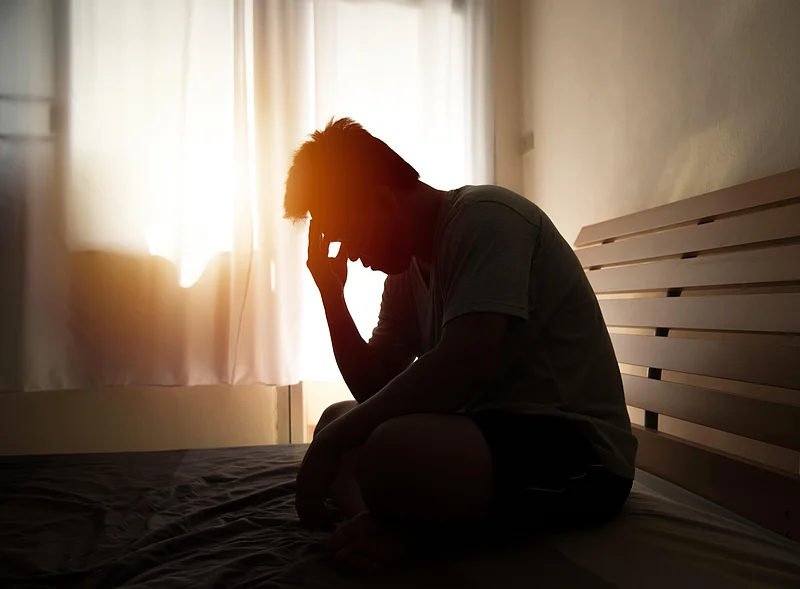Using the RefillRx mobile app? Then you will love our new, ENHANCED Sentry Drug Center mobile app.
Quickly request refills or login and manage your prescriptions on the go!
Available on both iTunes and Google Play.
Call or Visit for All of your Vaccination Needs!
Manténgase sano!

- Cara Murez
- Posted October 20, 2023
A New Dad's Postpartum Depression Can Be Tough on His Kids
It's well known that mothers can suffer postpartum depression, a condition that affects not only their well-being but also their child's development.
Now, new research finds that fathers can also experience depression after the births of their babies and this doubles their children's odds of having three or more adverse childhood experiences before the age of 5.
"There's a number of things that motivated our study. The first was that father's depression in the first year of life has already been shown to have other kinds of adverse effects on children, such as parenting difficulties or difficulties in child behavior later in life,"said study author Dr. Kristine Schmitz. She is an assistant professor of population health, quality improvement and implementation science at Rutgers Robert Wood Johnson Medical School in New Jersey.
"We also at baseline know that depression in fathers is often unrecognized and yet can be quite prevalent, so it's an important topic to pay attention to,"Schmitz added.
For this study, Schmitz wanted to explore what the association between a father's depression early in a child's life might have with adverse childhood experiences later in life.
Those experiences can include household dysfunction and child maltreatment. They can lead to future health and mental health issues, including well into adulthood. This can include poorer mental health, poorer school performance, obesity, asthma and high blood pressure.
Schmitz analyzed data on more than 1,900 father/child pairs from the Future of Families and Child Wellbeing Study. About 75% of the parents in the study were unmarried.
She investigated associations between depression in fathers in the first year of their child's life and adverse childhood experiences when they transitioned into kindergarten.
The risks of adverse child events as seen in the study went beyond sociodemographic factors and a mother's postpartum depression, Schmitz said.
"It's possible that when fathers are depressed they have a harder time engaging in a meaningful way with their kids, despite their desire to do so in many cases. And that may lead to either a physical absence, like what we found, or even more of an emotional absence,"Schmitz said.
Schmitz suggested the fathers should be screened for depression and offered treatment to reduce the risk of hardships suffered by their children.
Pediatricians already assess mother's depression, she noted. They also see fathers frequently at infant appointments during the first year and have a unique relationship with families for this reason.
"Just by the fact that you're with them frequently, you have the opportunity to gain trust and rapport, and ask about these more delicate questions,"Schmitz said. "But also fathers and pediatricians and mothers, of course, are all sort of jointly aligned around the goal of protecting and nurturing and allowing their child to reach their fullest potential."
That could give pediatricians a better rapport with parents when broaching this sensitive topic, she suggested.
Depending on where someone lives, there may be robust treatment options that are dad-focused, Schmitz said.
"We have a really robust maternal and child health policy in the United States, and I hope that will begin to expand to explicitly include fathers,"she added.
Schmitz is scheduled to present the findings Sunday at the American Academy of Pediatrics annual meeting, in Washington, D.C. Findings presented at medical meetings are considered preliminary until published in a peer-reviewed journal.
Most paternal postpartum depression occurs a little later than it does for mothers, noted Dr. Michael Yogman, a pediatrician at Cambridge Health Alliance in Cambridge, Mass., and past chair of the American Academy of Pediatrics Committee on Psychosocial Aspects of Child and Family Health.
For men, it starts when their babies are around 4 months old. Risk factors can include poverty, unemployment and relationship stresses, Yogman said.
Symptoms may be different and not as easily captured by traditional measures, he noted. These include irritability, aggression and undermining breastfeeding.
"When fathers are depressed, and particularly when both parents are depressed, the impact on children is really quite significant,"Yogman said.
It's important to realize this is a really critical time to encourage positive interactions between parents and children, he explained. Yet, even existing postpartum depression screening of mothers isn't reaching everyone. Screening rates are around 50%, he said.
Therapists are also not as familiar with having a father referred for postpartum depression, Yogman said.
"We need to develop a workforce that is receptive when fathers call. We've had fathers telling us that they would call, and the therapist was kind of dumbfounded that a father was asking for help,"Yogman said. "So, that's another piece of this dilemma that we need to solve before we can expect a real uptake in screening."
More information
The U.S. Centers for Disease Control and Prevention has more on adverse childhood experiences.
SOURCES: Kristine Schmitz, MD, assistant professor, population health, quality improvement and implementation science, Rutgers Robert Wood Johnson Medical School, New Jersey; Michael Yogman, MD, past chair, American Academy of Pediatrics Committee on Psychosocial Aspects of Child and Family Health, and pediatrician, Cambridge Health Alliance, Cambridge, Mass.; presentation, American Academy of Pediatrics annual meeting, Washington, D.C., Oct. 22, 2023
